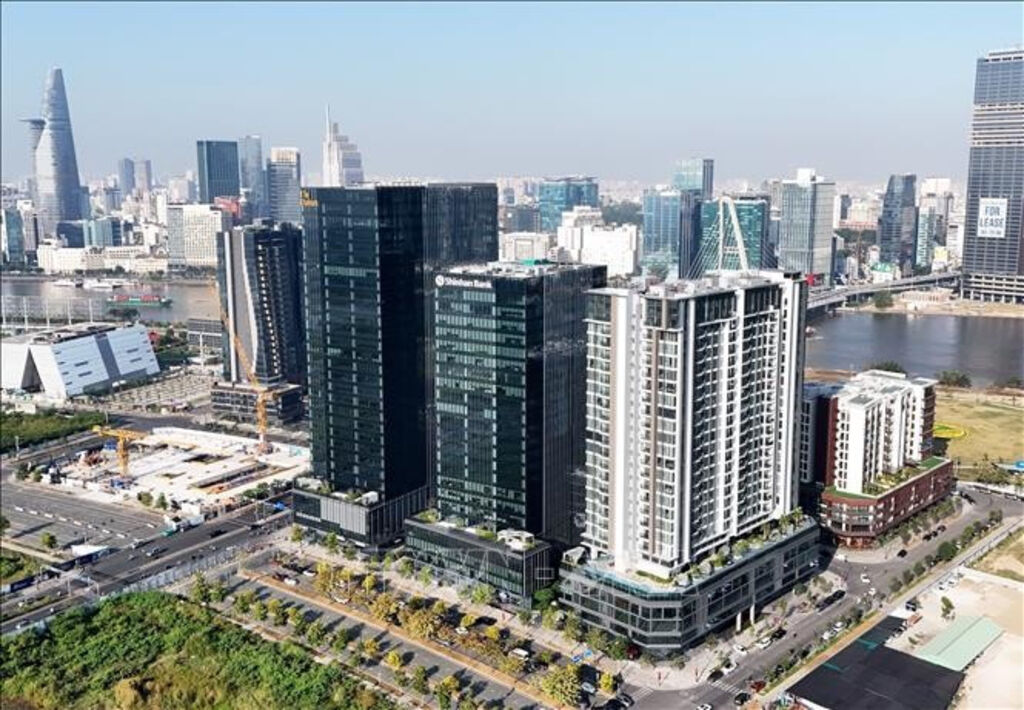 |
| The International Financial Center is slated for launch in November__Photo: VNA |
Vietnam’s planned International Financial Center (IFC), slated for launch in November, is attracting growing attention from global investors seeking a transparent legal framework, diverse investment options, advanced infrastructure and a quality living environment - elements essential for the IFC to become a trusted hub for international capital.
Investors eye IFC launch
Officials in Ho Chi Minh City have in recent months hosted multiple delegations seeking updates on the IFC plan, according to a member of the project’s advisory team. The uptick in site visits highlights escalating investor focus as Vietnam intensifies efforts to elevate its standing in global finance.
The momentum coincides with gains in Vietnam’s financial markets. FTSE Russell recently elevated Vietnam to secondary emerging market status, while Ho Chi Minh City climbed three spots to 95th in the latest Global Financial Centers Index, overtaking Thailand’s Bangkok. These milestones have bolstered faith in the nation’s IFC ambitions.
The topic dominated discussions at investor gatherings, including VinaCapital’s annual conference last week, which drew strong interest from foreign funds.
Vietnam still has substantial room for capital absorption, particularly in infrastructure and private sector expansion, said Don Lam, CEO and founding partner of VinaCapital. The IFC is poised to cultivate a sustainable long-term capital market to fuel these areas.
At the UK-Vietnam Business Summit hosted by the British Chamber of Commerce in Vietnam on November 5, UK Consul General Alexandra Smith said a well-executed IFC could deliver a transparent, globally aligned business ecosystem where investors grasp the rules and make decisions with greater speed and assurance. She noted that an effective IFC would instill sustained growth confidence among foreign investors and local private firms.
Phil Wright, Chief Operating Officer at HSBC Vietnam, observed that the IFC is still in nascent stages and needs sharper clarity on operational boundaries, allowable financial products and supervisory mechanisms. These details will be critical and are expected to be clarified in due course, he said.
Investor expectations
According to experts, the IFC’s success will depend foremost on its legal structure. Though the Vietnamese National Assembly has passed a Resolution on the establishment of the IFC, the decisive test will be in the detailed implementation.
Andrew Vallis, independent director at Ho Chi Minh City Securities Corporation, said a thriving IFC could spawn a new high-value industry for Vietnam, drawing foreign funds, know-how and high-skilled employment. Yet, he underscored that legal design poses a fundamental hurdle.
Major financial centers such as Hong Kong, Singapore and Dubai rely on the Common Law, which allows precedent-based decision-making and provide higher predictability for investors. Vietnam’s civil law system, in contrast, centers on Constitution-based regulations.
It is highly likely that IFC Vietnam will adopt the Common Law model – a wise decision, even though it will involve certain clashes with the domestic civil law system, said Vallis.
According to him, the Common Law brings uniformity and is trusted by the global investment community, allowing businesses to "know in advance what could happen" in transactions, thereby fostering trust and international capital flow. This will be a foundational shift, helping IFC Vietnam approach international standards of governance, transparency, and investor protection.
Nguyen Quoc Dung, CEO of EastSpring Vietnam, said the IFC should not operate as a standalone enclave but be integrated into the broader economy. He called for expanding investment opportunities beyond traditional equities and bonds to include derivatives, securitized products, and green-finance instruments.
He also urged accelerating state-owned enterprise privatization to expand stock markets, alongside developing pension and green investment funds, and infrastructure bonds to pull in long-term capital.
“To lure top-tier investors, Vietnam must continue improving legal framework, transparency, corporate governance and financial market infrastructure,” he said.
Human capital is also seen as a determining factor. While Vietnam has a young and dynamic workforce, investors insisted on greater emphasis on financial-sector skills and global governance capabilities.
Talent recruitment and cultivation will prove vital to the IFC’s triumph, said Christopher Jeffery, Pro-Vice Chancellor of International, Strategy & Engagement at the British University Vietnam.
Despite the obstacles, Vietnam is moving in the right direction. If executed effectively, the IFC could become a strategic step toward Vietnam’s goal of achieving high-income status by 2045, said investors.- (VNA/VLLF)









